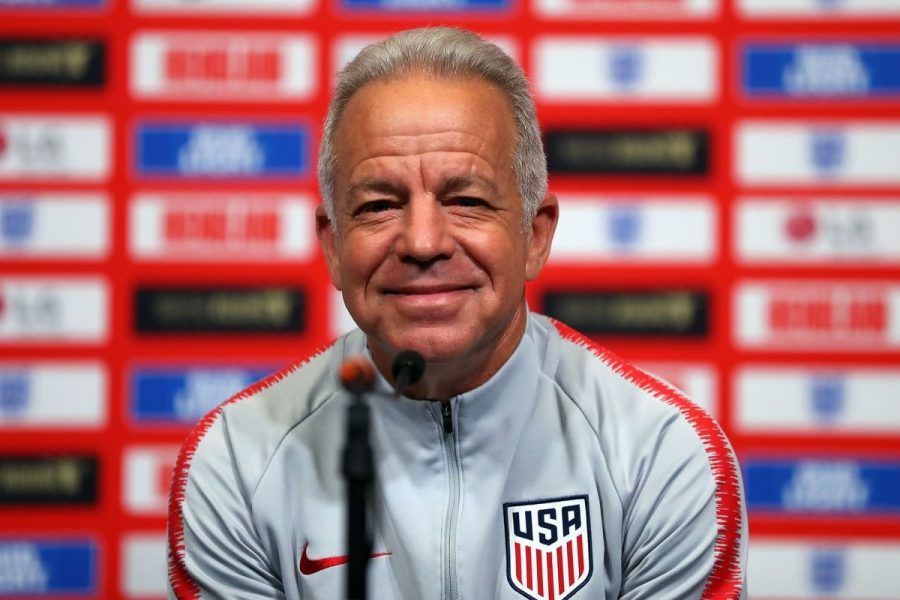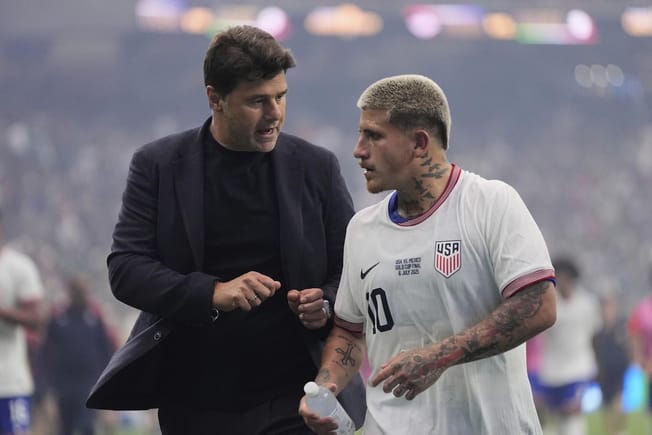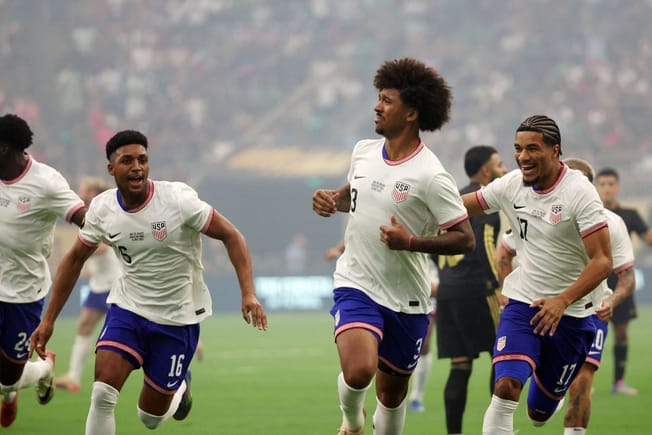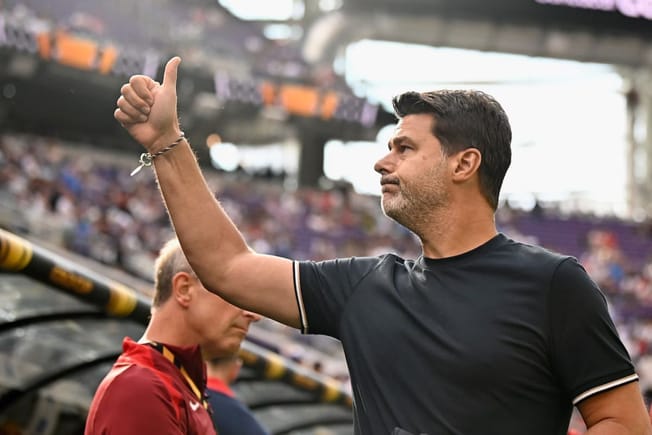Quick Hits
- After missing out on the 2018 World Cup, the United States entered into a new, strange, and prolonged era under interim manager Dave Sarachan
- Here’s how Sarachan guided the USMNT during a period of major uncertainty and helped mold stars you’ll see on the field for the United States in Qatar
The dust had barely begun to settle after that catastrophic night in Couva.
The United States men’s national team had just lost to Trinidad and Tobago. And that loss, mixed with a perfect storm of results from around the region, meant the United States would miss the World Cup for the first time since 1986. The present was seemingly impossible to digest, but someone had to sort out the immediate future. Someone had to trudge through the debris and carry a wounded, publicly ridiculed U.S. men’s program to its final camp of the year.
“It was clear Bruce [Arena] was going to step down. He told me that, he told [U.S. Soccer’s managing director of administration] Tom King that. Tom had mentioned that we had a friendly coming up in November against Portugal,” Dave Sarachan told Backheeled.
Arena, who managed the U.S. as they missed out on the 2018 World Cup, suggested Sarachan handle it. A few days later, Sarachan spoke to U.S. Soccer. Initially, his agenda was just that one game to wrap up an indelibly stained 2017.
Sarachan was Arena’s assistant coach for most of the previous two decades with DC United, the USMNT during Arena’s first cycle, and again with the LA Galaxy. He was also Arena’s assistant for a few years at the University of Virginia back in the 1980s. Sarachan had been a head coach in his own right, too, at Cornell for a decade and later in MLS with the Chicago Fire for over four seasons. However, this would be a totally different kind of test.
Turning the page on this low point for the U.S. was going to be very, very difficult. And it was going to take some time.
A GLIMMER OF HOPE
Sarachan was aware of the schedule for 2018’s January camp and, to an extent, the rest of the year’s fixture list. “But there was no expectation that, ‘Dave, we’re going to keep you on for three months, six months, eight months.’ It was, ‘Let’s get through the November game and reassess,’” Sarachan said.
“Once we didn’t qualify, it was like the whole world felt like a building was on fire,” long-time USMNT press officer Michael Kammarman remembered. “It was almost like it was existing in a vacuum, but it still had to keep going. Dave Sarachan just wound up being the absolute right guy at the right time to be able to be a steward of the program.”
“There was nothing beyond the Portugal game that I had thought about because we were all numb from the [Couva] experience,” Sarachan said. “There was so much uncertainty at the executive level, at the technical level… Honestly, there was no discussion [about the future] beyond that.”
The friendly against Portugal was the first small, yet memorable step towards a new era.
“Even before the game started, just having these younger guys in the group. There was an immediate burst of energy, burst of excitement, a lot of youth in our training,” Sarachan said. Plenty of that energy was courtesy of midfielder Tyler Adams.
“Tyler, he came as advertised, man. In the first 20 minutes of training, he covered more ground than any player I’ve had in two consecutive training sessions,” Sarachan said. “And I actually had to pull him aside [and tell him], ‘Tyler. I appreciate you play for Red Bull. But hey man, rev it down… I mean, he came in guns blazing.”
Adams and another teenager, Weston McKennie, were the two starters making their USMNT debut that night in Leiria, Portugal. “Ronaldo and a few others weren’t on the field, but we knew at that time – Portugal, I think, was third in the world – it was going to be a challenge,” Sarachan said.
In the 21st minute, McKennie gave the U.S. the lead. After the ball hit the back of the net, there was a cathartic celebration.
“When Weston scored, the first thing I thought about was honestly the fans,” Sarachan said. “I don’t know how many people tuned in after the Trinidad match, but I just felt a sense of, ‘Boy, this could be fun with these young guys.’”
The U.S. drew the reigning European champions 1-1, and there were certainly reasons to be encouraged. Sarachan said as much after the game.
“I remember really specifically going into the locker room and speaking to the group. I’m paraphrasing, but it was sort of like, ‘Look, it’s been a tough 2017, but the future truly is bright.’ The effort that the group gave and the focus was for the future. I was really proud of them and I think it was that feeling like, ‘Okay, let’s get 2018 going. Let’s get these young guys kickstarted. Because I think there’s some real talent there. Young, but talented.’”
FOUNTAIN OF YOUTH
Entering 2018, it was increasingly obvious Sarachan would stay in his role longer than anticipated.
The U.S. Soccer presidential election wasn’t until February, and even after that, signs pointed towards the development of a different leadership structure on the sporting side of the organization. Earnie Stewart was named the first ever USMNT general manager in June, and he started his job – the process of hiring a new head coach – in August. While there was plenty of frustration from outside U.S. Soccer about how slow the federation moved to hire a new permanent manager, from January onwards, Sarachan rolled up his sleeves.
On Earnie Stewart’s first day at Soccer House in Chicago, the new #USMNT general manager sat down with sport development officer Nico Romeijn, head coach Dave Sarachan, and youth technical director Tab Ramos to discuss the player pool. pic.twitter.com/ToxjGc8LJQ
— U.S. Men's National Soccer Team (@USMNT) August 6, 2018
“It was like, ‘Dave, here are the keys. Do it the way you think makes sense.’ And my thinking at that time was obviously, we have to introduce a lot of younger guys, no doubt. Because we have to take the broader view of four years down the line. Also, knowing in my experience with successful teams at all different levels, the importance of blending in some veterans. But obviously on the scale, it would be the younger guy,” Sarachan said.
In his year in charge, 23 players made their senior national team debut. That stat reflects the reality of a pool that had a gaping hole between the promising kids on the youth national team conveyor belt and the old guard.
“Whether or not the team qualified or didn’t qualify, that core group that was playing that qualifying was a little bit – I don’t want to sound wrong – was a little bit more on the older side,” McKennie, a product of that conveyor belt, said. “So whether they qualified or didn’t, there was going to be a time period where younger players were going to get their opportunity and get their chance. Because we didn’t qualify, it came a little bit earlier than expected.”
Striker Josh Sargent epitomized Sarachan’s commitment to developing the next generation. In 2017, the St. Louis native became the second-ever American to play in a U-17 and U-20 World Cup in the same year. Sarachan called him up against Portugal, but an injury prevented Sargent from making his U.S. debut. Sargent signed with Werder Bremen at the beginning of 2018, and although he didn’t make his competitive debut until December of that year, Sarachan continued to call him up as his fitness allowed.
“That was always an interesting one when his name came up early on, because at the time Josh [Sargent] wasn’t playing a lot with his club. I brought in Josh from the get go, having seen him at every youth level perform and do a great job. And we’re so thin at the number nine position,” Sarachan said.
Stewart was hesitant about calling up Sargent because he wasn’t playing for his club at the time.
“I said, ‘well, first of all, we’re not Germany. We’re not France. We’re not England where we’re that deep. We don’t have many nines.'”
A senior national team call up is supposed to be exciting. It should be a dream come true, especially when you climb the ladder as quickly as Sargent did. But Sargent, like any other player or coach, sensed how awkward this stretch was for the USMNT.
“It was a bit of a weird time. Nobody was really sure who was going to take over as head coach,” Sargent said. “But I think it was a really good opportunity to bring in a lot of guys who haven’t had a chance and they were able to prove themselves out on the pitch and get a lot of minutes with the national team.”
BAPTISM BY FIRE
The United States loss to Trinidad and Tobago in October, 2017 cratered the American public’s expectations for the USMNT. The program’s mainstream reputation ranged from joke to afterthought.
“There was so much angst and disappointment. The public sentiment, it was rough,” Sarachan recalled.
Nevertheless, the Development Academy – founded in 2007 – was quietly bearing fruit. While the pillars of the future were emerging, Kammarman believes that the lack of attention may have been beneficial.
“Given the fact that we had so many young players and so much turnover, the fact that there wasn’t that much attention on the team at that time maybe was actually helpful. Maybe it gave them a chance to get their feet under them, without the scrutiny and the pressure that they might have otherwise,” Kammarman said.
Sarachan’s priority was expanding the pool and letting players develop, yet remaining in charge well into 2018 obligated him to weigh results, too. Not because of scrutiny and pressure, but because of a desire to slowly restore American confidence in the United States men’s national team. However, the U.S.’s opponents during the Sarachan era were far from pushovers.
They played Portugal in Portugal. Later there was France in France. Then Brazil. Then Colombia. Then England at Wembley. Then Italy. With Sarachan as the caretaker manager, the USMNT’s schedule included several superior European and South American opponents. It was a daunting challenge under any circumstances.
“That was a very difficult year. When you look at the average opponent rank, it’s crazy. I mean, it’s off the charts,” said current USMNT head coach Gregg Berhalter.
“We played some huge games,” Kammarman said, echoing Berhalter. “We probably played one of the toughest schedules we ever have in a single year for the national team.”
“As we got into the March window and started looking ahead a little bit, and when I knew that I was going to continue on, at least through June, part of me said, ‘Well look, whenever we do anything we want to win.’ Winning is still important… It was still a combination of vetting young guys, but results were important so that we’d begin to bring back some faith in the men’s program and the new direction we were going,” Sarachan said.
Sarachan considered a 1-1 draw against France in June “a pivotal point” in that mission. The Americans defended resolutely to surprisingly spoil the hosts’ World Cup sendoff in Lyon. After the match, Sarachan was so impressed with the opponents that he told French manager Didier Deschamps that France would win the World Cup. About five weeks later Les Bleus indeed lifted the trophy in Russia.
“It wasn’t a World Cup game. It wasn’t a qualifier. So the pressure of those types of games was off. This was, ‘we’re playing with house money’ kind of game. No one expected us to get a result, I’m sure. And our guys went into that game with no fear,” Sarachan said. “At about 75th minute, I remember in my own head thinking, ‘I think we’ve turned the corner in terms of respect, in terms of getting interest back, we’re competing against this team.’”
The U.S.’s 2018 schedule was an unrelenting reminder of the standard American men’s soccer still aspires to reach.
“The one thing I remember is Tyler Adams sitting there at halftime and shaking his head. And I said to Tyler, ‘What’s up man? This is good,’” Sarachan said. “He goes, ‘Oh, I know. N’Golo Kanté, I’ve never seen anyone run like this guy in my life.’ His head was spinning, he couldn’t believe the guys he was facing.”
Sarachan also singled out Gareth Southgate’s England as a top tier measuring stick.
“For historical reasons, playing in Wembley was quite an experience. But what stuck out to me in that game was they didn’t field their ‘A’ team on that day. And I was just pretty amazed at the size and speed… these guys were really fit and good and deep. And it really hit me, ‘We still have a ways to go.’”
On that night in November, 2018, England cruised to a 3-0 victory. “They came out very quickly, and we were on our back foot a little bit. But again, we had an extremely young team that hadn’t really played together at that time, so I’m sure we’re going to be a lot more prepared this time,” veteran defender DeAndre Yedlin said.
Four years later, it’ll be two very different lineups facing each other on a November night at the World Cup in Qatar. On this occasion, the United States has a chance to prove they’ve started to close the gap that separates them from the international elite.
“They were difficult games, but what you saw was the group being tested, younger players getting their first taste of international soccer, and also realizing that, ‘Okay, we’re not there yet, but it’s not like the gap is night and day. It’s not like we can’t close that gap,’” Berhalter said. Ultimately, the USMNT went 3-4-5 under Sarachan, and gained global exposure much more important long-term than that record. “And that was the important thing we talked about when we first got together [after I took over], is how are we going to close that gap.”
SARACHAN ON BERHALTER
When Berhalter was 16, Sarachan was his coach in the Olympic Development Program, a selective, supplementary platform to club soccer for top prospects. They’ve known each other for over 30 years, and were part of the national team together – Sarachan as an assistant coach and Berhalter as a defender – during the 2002 World Cup cycle.
Once Berhalter took the reins as USMNT manager in December, 2018, he and Sarachan had discussions about the pool.
“He’s been around, but he was somewhat surprised at how the public views this national team. And how critical everybody was,” Sarachan said. “And I said, ‘Gregg, get used to it because you know everybody’s an expert in the sport. Just be true to you. Be true to your beliefs, your philosophy and the way you see the game.’”
Sarachan observed that Berhalter has evolved in the application of his ideas. The national team job necessitated that adjustment.
“I think he grew on the job. All coaches – but young coaches, typically – have to have experiences that make them better the next time out and I think from start to finish [this cycle], he grew as a coach. He’s got to have the ability to adapt, or at least accept that ability to adapt. And I think going into the project, he might have had a little bit more rigidity than he probably did at the end,” Sarachan said.
SARACHAN’S LEGACY
Following two seasons with North Carolina FC, Sarachan left the club when it opted to move from the USL Championship to USL League One. He then quickly jumped back into international soccer, becoming the head coach of Puerto Rico.
El experimentado entrenador de fútbol estadounidense Dave Sarachan es el nuevo entrenador en jefe del @HuracanAzulPR🇵🇷 que se prepara para las eliminatorias de CONCACAF de la Copa Mundial de FIFA de Catar 2022.
— Federación Puertorriqueña de Fútbol ⚽️🇵🇷 (@FPFPuertoRico) February 24, 2021
📰 Detalles aquí » https://t.co/JyrFX4IcZ0 pic.twitter.com/i3qectnf7i
“I’ve had pretty much two years with Puerto Rico. It’s been a good, challenging project for me. I don’t need to be based in Puerto Rico,” Sarachan said. He’s lived in Omaha, Nebraska for just over a year because his son, Ian, became an assistant coach for the Creighton Men’s Soccer Team. Dave and his wife, Cherie, decided to be close to family.
“They hired me primarily to get through the World Cup qualifiers. Obviously, we wanted to try to qualify, but it was more important to push our rankings further, be more competitive within Nations League and CONCACAF. I also did the Under-20s. Both programs were very satisfying for me because we kind of had to revamp a lot of the whole program in terms of scouting and training camps. So my experience was very favorable, positive. They’re good people, they mean well. They’re limited in their resources,” Sarachan said.
He’s proud of how the senior team has progressed from Group C to Group B of Concacaf Nations League, and how the U-20s qualified for the Round of 16 at the Concacaf U-20 Championship. Sarachan is now out of contract with Puerto Rico, and while a return is possible, he’s keeping his options open. He doesn’t plan too far ahead, and perhaps that’s what enabled him to be a successful bridge – amidst all the uncertainty – from Arena to Berhalter.
“He never once worried about what was going on with him. He never worried about his own future, he worried about what’s the best way to keep this program moving forward,” Kammarman said.
“During that segment, I had a job to do,” Sarachan said. “Obviously I had kept one eye open for any other opportunities that may come across my way but… I was pretty focused on making sure we got through these friendlies in the right way.”
Berhalter commended Sarachan’s selflessness.
“I think he deserves a lot of credit for that role. It wasn’t an easy role. He’s been a long time assistant to Bruce, and then to stay on and to do the national team for a year, that schedule that you have, like, it was complicated,” Berhalter said. And he stood up and did it for his country. And I have a lot of respect for that.”
Sarachan, 68, introduced many players young enough to be his grandchildren to international soccer. Adams, McKennie, Sargent, Tim Weah, Cameron Carter-Vickers, Antonee Robinson, the list goes on.
“A lot of those players are the ones that you’re going to be seeing step on the field in the World Cup,” Kammarman said. Indeed, nine players who debuted under Sarachan ended up making Gregg Berhalter’s 26-man roster. “And it doesn’t mean that they wouldn’t have anyway, but the way he was able to guide them and onboard them in the process was a great starting point for what we’ve been able to do with these three years.”
Sarachan will tune in to the World Cup from Nebraska, on the couch with his grandkids.







Comments